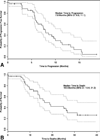Phase 2 study of carboplatin, docetaxel, and bevacizumab as frontline treatment for advanced nonsmall-cell lung cancer
- PMID: 20225327
- PMCID: PMC5145307
- DOI: 10.1002/cncr.24996
Phase 2 study of carboplatin, docetaxel, and bevacizumab as frontline treatment for advanced nonsmall-cell lung cancer
Abstract
Background: Bevacizumab has recently been demonstrated to prolong overall survival when added to carboplatin and paclitaxel for chemotherapy-naïve patients with nonsquamous nonsmall-cell lung cancer (NSCLC). However, the effects of combining bevacizumab with other standard, front-line, platinum-based doublets have not been extensively explored. We designed this single treatment arm, phase 2 trial to determine whether the combination of carboplatin, docetaxel, and bevacizumab is tolerable and prolongs progression-free survival of chemotherapy-naïve patients with advanced, nonsquamous NSCLC.
Methods: Forty patients were treated with up to 6 cycles of carboplatin (AUC 6), docetaxel (75 mg/m(2)), and bevacizumab (15 mg/kg) on Day 1 every 21 days. Patients with an objective response or stable disease received maintenance bevacizumab (15 mg/kg) every 21 days until disease progression. The primary endpoint was median progression-free survival. Secondary endpoints included safety, response rates, and overall survival.
Results: The median number of chemotherapy and maintenance bevacizumab cycles/patient was 6 and 2, respectively. Grades 3-5 adverse events included febrile granulocytopenia (10%), infections (13%), bleeding (13%), thrombotic events (13%), hypertension (5%), bowel perforation (5%), and proteinuria (3%). Median progression-free survival was 7.9 months and median overall survival was 16.5 months. Partial responses were observed in 21 patients (53%), and stable disease >or=6 weeks occurred in another 17 patients (43%), for a disease control rate of 95%.
Conclusions: Carboplatin, docetaxel, and bevacizumab were feasible and effective for front-line treatment of advanced, nonsquamous NSCLC. These data provide further evidence that bevacizumab may be used in combination with multiple standard, platinum-based doublets in this setting.
(c) 2010 American Cancer Society.
Figures
Similar articles
-
Phase II trial of carboplatin, paclitaxel, cetuximab, and bevacizumab followed by cetuximab and bevacizumab in advanced nonsquamous non-small-cell lung cancer: SWOG S0536.J Thorac Oncol. 2013 Dec;8(12):1519-28. doi: 10.1097/JTO.0000000000000009. J Thorac Oncol. 2013. PMID: 24189513 Free PMC article. Clinical Trial.
-
Phase II trial of nanoparticle albumin-bound paclitaxel, carboplatin, and bevacizumab in first-line patients with advanced nonsquamous non-small cell lung cancer.J Thorac Oncol. 2009 Dec;4(12):1537-43. doi: 10.1097/JTO.0b013e3181c0a2f4. J Thorac Oncol. 2009. PMID: 19887966 Clinical Trial.
-
Phase 2 study of S-1 and carboplatin plus bevacizumab followed by maintenance S-1 and bevacizumab for chemotherapy-naive patients with advanced nonsquamous non-small cell lung cancer.Cancer. 2013 Jun 15;119(12):2275-81. doi: 10.1002/cncr.28048. Epub 2013 Apr 4. Cancer. 2013. PMID: 23558513 Clinical Trial.
-
Phase 2 trial of maintenance bevacizumab alone after bevacizumab plus pemetrexed and carboplatin in advanced, nonsquamous nonsmall cell lung cancer.Cancer. 2012 Nov 15;118(22):5580-7. doi: 10.1002/cncr.27576. Epub 2012 Apr 27. Cancer. 2012. PMID: 22544579 Clinical Trial.
-
Phase II study of first-line sequential chemotherapy with gemcitabine-carboplatin followed by docetaxel in patients with advanced non-small cell lung cancer.Oncology. 2005;68(4-6):382-90. doi: 10.1159/000086979. Epub 2005 Jul 12. Oncology. 2005. PMID: 16020967 Review.
Cited by
-
Feasibility of cisplatin/pemetrexed with 15 mg/kg bevacizumab for the treatment of patients with advanced non-squamous non-small cell lung cancer.Oncol Lett. 2015 Jun;9(6):2577-2582. doi: 10.3892/ol.2015.3086. Epub 2015 Mar 30. Oncol Lett. 2015. PMID: 26137109 Free PMC article.
-
Spliceostatin A blocks angiogenesis by inhibiting global gene expression including VEGF.Cancer Sci. 2010 Nov;101(11):2483-9. doi: 10.1111/j.1349-7006.2010.01686.x. Cancer Sci. 2010. PMID: 20726856 Free PMC article.
-
Antiangiogenic agents in combination with chemotherapy in patients with advanced non-small cell lung cancer.Cancer Invest. 2011 May;29(4):325-37. doi: 10.3109/07357907.2011.554476. Cancer Invest. 2011. PMID: 21469981 Free PMC article. Review.
-
Bevacizumab in advanced NSCLC: chemotherapy partners and duration of use.Curr Treat Options Oncol. 2013 Dec;14(4):595-609. doi: 10.1007/s11864-013-0255-3. Curr Treat Options Oncol. 2013. PMID: 23990213 Review.
-
Circulating endothelial and endothelial progenitor cells in non-small-cell lung cancer.Clin Transl Oncol. 2010 Aug;12(8):521-5. doi: 10.1007/s12094-010-0549-x. Clin Transl Oncol. 2010. PMID: 20709649 Review.
References
-
- Merrick DT, Haney J, Petrunich S, et al. Overexpression of vascular endothelial growth factor and its receptors in bronchial dypslasia demonstrated by quantitative RT-PCR analysis. Lung Cancer. 2005;48:31–45. - PubMed
-
- Yuan A, Yu CJ, Kuo SH, et al. Vascular endothelial growth factor 189 mRNA isoform expression specifically correlates with tumor angiogenesis, patient survival, and postoperative relapse in non-small-cell lung cancer. J Clin Oncol. 2001;19:432–441. - PubMed
-
- Shimanuki Y, Takahashi K, Cui R, et al. Role of serum vascular endothelial growth factor in the prediction of angiogenesis and prognosis for non-small cell lung cancer. Lung. 2005;183:29–42. - PubMed
-
- Kaya A, Ciledag A, Gulbay BE, et al. The prognostic significance of vascular endothelial growth factor levels in sera of non-small cell lung cancer patients. Respir Med. 2004;98:632–636. - PubMed
-
- Han H, Silverman JF, Santucci TS, et al. Vascular endothelial growth factor expression in stage I non-small cell lung cancer correlates with neoangiogenesis and a poor prognosis. Ann Surg Oncol. 2001;8:72–79. - PubMed
Publication types
MeSH terms
Substances
Grants and funding
LinkOut - more resources
Full Text Sources
Medical


